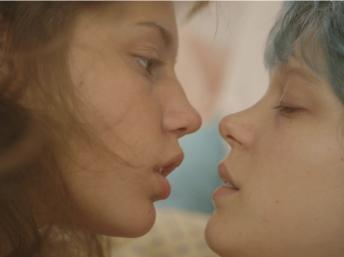Blue is the warmest color (La Vie D’Adèle)
Finally a discovery at the Cannes Festival that’s worth getting all worked up about: “Blue is the Warmest Color,” or, as the original title, “La Vie D’Adèle.” Three hour-long film is a bright gem and a contender for the top nod at this otherwise tepid Cannes selection. “Blue,” starring newcomer Adèle Exarchopoulos and Léa Seydoux and directed by Abdellatif Kechiche, is my choice for this year’s Palme D’or, with five films still remaining to be screened in the competition section. But with Steven Spielberg as president of the jury, it’s difficult to see this win crystallize because of some pretty intense, albeit essential, intimate scenes. All we can hope for is that Ms. Exarchopoulos goes home with a clearly-deserved Best Actress prize.
In the course of three hours this chronologically-told story about the absoluteness of love, the passage of time and being emotionally solitary, might just rip your heart open. The intense love story which brings together Adele and Emma (Lea Seydoux) in their hometown of Lille, France, is served up with tenderness, simplicity and eagerness by French-Tunisian filmmaker Kechiche. Here’s a filmmaker–with whose work I had an intellectual falling out after hating his “Black Venus–who has made an incredibly lucid and audacious film which has, in the process, reconciled me with his work.
Adele (Exarchopoulos) is your average high-school kid who hangs out with her girlfriends and smokes cigarettes. On an afternoon someone she observes passing her by makes her dizzy and she freezes in the middle of a street crossing. Emma (Seydoux) is beautiful, youthful woman with blue eyes and even bluer hair. The denim jacket she wears strangely and her non-conformist air, however belie authority and experience.
These two girls are defined by their want to have vocations—Adele wants to teach kindergarten and Lea is an aspiring painter—and their differing social backgrounds. They are brought together by a sentiment that burns extraordinarily bright.
It is worth mentioning, again, that Adele Exarchopoulos’s performance is one of the best and most stirring ones I have seen in a while. She imbues her character with strength, courage and devotion, and what she feels after her separation from her girlfriend is exquisite and also very painful. Truly a tour-de-force on her part. “Blue is the warmest color” is the outstanding film out of this year’s program, thus far.







